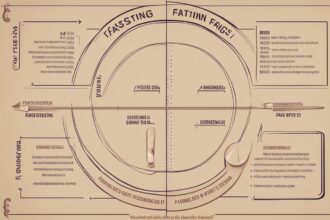Hey there, health enthusiasts! If you’re on a journey to improve your well-being, you’ve likely stumbled across two popular approaches: health fasting and dieting. Both promise weight loss, better energy, and improved overall health, but which one is truly right for you? Today, we’re diving deep into the world of fasting and dieting to unpack their benefits, challenges, and science-backed effects on your body. Whether you’re curious about intermittent fasting for health or cutting calories through a structured diet, this post will help you make an informed choice. Let’s break it down together with practical tips and real insights to guide your wellness path.
What Is Health Fasting, and How Does It Work?
When we talk about health fasting, we’re referring to a practice where you voluntarily abstain from food and sometimes drinks for a specific period. This isn’t about starvation—it’s a structured approach to eating that cycles between periods of eating and fasting. Popular methods include intermittent fasting (like the 16/8 method, where you fast for 16 hours and eat during an 8-hour window) and longer fasts like a 24-hour fast once a week. The goal? To give your body a break from constant digestion and tap into stored energy reserves.
Scientifically, fasting triggers a process called autophagy, where your cells clean out damaged components and regenerate. This can promote longevity and reduce inflammation (Mattson et al., 2017). Plus, fasting often leads to a calorie deficit, which can aid in weight loss without the need to obsess over every bite. But it’s not just about shedding pounds—fasting for health has been linked to improved insulin sensitivity and better metabolic markers (Patterson & Sears, 2017). That said, it’s not a one-size-fits-all solution, and we’ll explore why as we go.
What Is Dieting, and How Does It Differ?
Dieting, on the other hand, typically involves a structured eating plan with specific rules about what, when, and how much you eat. Think of diets like keto (low-carb, high-fat), Mediterranean (plant-based with healthy fats), or classic calorie-counting plans. Unlike health fasting, dieting focuses on altering the content or quantity of your food intake rather than the timing. It’s often more flexible in terms of when you eat but can feel restrictive if the rules are strict.
Research shows that dieting can be effective for weight loss and managing conditions like diabetes or high cholesterol, especially when tailored to individual needs (Sacks et al., 2009). However, many diets fail long-term because they’re hard to sustain—think yo-yo dieting where weight comes back faster than it left. Unlike fasting, which works with your body’s natural rhythms, dieting often requires constant willpower and planning. So, how do these two stack up when it comes to real results?
Key Benefits of Health Fasting Over Dieting
One reason health fasting is gaining traction is its simplicity and potential for profound health benefits. Let’s look at some standout advantages that might make fasting a better fit for your lifestyle compared to traditional dieting:
- Metabolic Flexibility: Fasting helps your body switch between burning carbs and fats for fuel, improving energy efficiency (Anton et al., 2018).
- Simpler Rules: No need to count calories or weigh food—just stick to your fasting window.
- Cellular Repair: Autophagy during fasting may protect against age-related diseases (Mattson et al., 2017).
- Improved Focus: Many report sharper mental clarity during fasting due to stable blood sugar levels.
These benefits make fasting for health an appealing option, especially if you’re tired of complicated meal plans. But it’s not without its hurdles, which we’ll cover soon.
Advantages of Dieting and Where It Shines
While health fasting has its perks, dieting offers unique strengths, especially for those who prefer structure over timing-based restrictions. Here are some reasons why a well-planned diet might work better for you:
- Customization: Diets can be tailored to specific health needs, like low-sodium for hypertension or gluten-free for celiac disease.
- Nutrient Focus: Many diets emphasize balanced nutrition, ensuring you get essential vitamins and minerals (Sacks et al., 2009).
- Gradual Approach: Unlike fasting, which can feel intense, dieting allows for slower, steady changes.
- Community Support: Popular diets often come with recipes, apps, and groups to keep you motivated.
Dieting can be a fantastic tool if you enjoy planning meals or have specific dietary requirements. However, the constant decision-making can wear you out if you’re not prepared for the mental load.
Challenges and Risks: Fasting vs Dieting
Let’s get real—neither health fasting nor dieting is a magic bullet. Both come with challenges that could trip you up if you’re not careful. Fasting, for instance, isn’t for everyone. If you have a history of eating disorders, are pregnant, or have certain medical conditions like diabetes, fasting can be risky without medical supervision (Grajower & Horne, 2019). You might also experience hunger pangs, irritability, or fatigue during the initial adjustment phase. I’ve been there—those first few days of intermittent fasting felt like my stomach was staging a protest!
Dieting has its own pitfalls. Restrictive diets can lead to nutrient deficiencies if not planned properly, and the focus on “forbidden foods” often triggers cravings or binge eating (Polivy & Herman, 2002). Plus, many diets don’t teach sustainable habits, leaving you back at square one once the plan ends. The key with either approach is to listen to your body and consult a healthcare provider if you’re unsure. So, how do you decide which path to take?
How to Choose Between Health Fasting and Dieting
Choosing between health fasting and dieting boils down to your lifestyle, goals, and personal preferences. If you’re someone who hates tracking macros and loves simplicity, fasting for health might be your jam. Start with something gentle like the 16/8 method—skip breakfast, eat between noon and 8 PM, and see how you feel. On the other hand, if you thrive on structure and enjoy experimenting with recipes, a balanced diet like the Mediterranean plan could be a better fit.
Consider your health conditions too. Fasting can be powerful for metabolic health, but it’s not ideal if you need regular meals to manage blood sugar. Dieting allows more control over what you eat but requires consistency. My advice? Experiment with both under guidance. Try a week of intermittent fasting, then a week of a flexible diet plan, and note how your body and mind respond. Remember, sustainable weight loss and wellness come from habits you can stick with long-term, not quick fixes.
In wrapping up, both health fasting and dieting offer valuable paths to better wellness, but they cater to different needs and personalities. Fasting for health shines with its simplicity and deep cellular benefits, while dieting provides structure and customization for specific nutritional goals. The best choice is the one that aligns with your life and feels sustainable. Whether you’re drawn to the rhythmic cycles of intermittent fasting or the detailed planning of a diet, prioritize balance and listen to your body. Got questions or personal experiences with either? Drop a comment—I’d love to hear your story and help you navigate your health journey!
References
- Anton, S. D., Moehl, K., Donahoo, W. T., Marosi, K., Lee, S. A., Mainous, A. G., … & Mattson, M. P. (2018). Flipping the metabolic switch: Understanding and applying the health benefits of fasting. Obesity, 26(2), 254-268. https://doi.org/10.1002/oby.22065
- Grajower, M. M., & Horne, B. D. (2019). Clinical management of intermittent fasting in patients with diabetes mellitus. Nutrients, 11(4), 873. https://doi.org/10.3390/nu11040873
- Mattson, M. P., Longo, V. D., & Harvie, M. (2017). Impact of intermittent fasting on health and disease processes. Ageing Research Reviews, 39, 46-58. https://doi.org/10.1016/j.arr.2016.10.005
- Patterson, R. E., & Sears, D. D. (2017). Metabolic effects of intermittent fasting. Annual Review of Nutrition, 37, 371-393. https://doi.org/10.1146/annurev-nutr-071816-064634
- Polivy, J., & Herman, C. P. (2002). Causes of eating disorders. Annual Review of Psychology, 53, 187-213. https://doi.org/10.1146/annurev.psych.53.100901.135103
- Sacks, F. M., Bray, G. A., Carey, V. J., Smith, S. R., Ryan, D. H., Anton, S. D., … & Williamson, D. A. (2009). Comparison of weight-loss diets with different compositions of fat, protein, and carbohydrates. New England Journal of Medicine, 360(9), 859-873. https://doi.org/10.1056/NEJMoa0804748






